

Crisis on Campus: the Untold Story of Student Suicides - College Degree Search. Should Suicidal Students Be Forced to Leave Campus? On a Saturday night in the winter of 2012, W.P., a freshman at Princeton, was alone in his dorm room and couldn’t stop crying.

He’d just had a conversation with his girlfriend that made him feel distant from her, and from everyone. He called his mom and a few friends, but no one could talk. He picked up an old bottle of Trazodone, an antidepressant that he’d stopped taking a few weeks earlier, and swallowed twenty pills. Then he considered how upset his mother would be if he died. “I thought about how important I am to her,” he said. He tried to vomit, and when that failed he walked to the student health center and reported that he’d tried to commit suicide. After three days in the hospital, W.P. was preparing to leave when his mother was informed, through a phone call from Princeton’s director of student life, that W.P. was no longer allowed to attend classes or return to his dorm.
Two weeks after being banned from his classes, W.P. appealed Princeton’s decision. Navigating the Uncertain Waters of Suicidal Students on Campus. Inside Higher Ed recently reported a situation involving Western Michigan University (WMU).
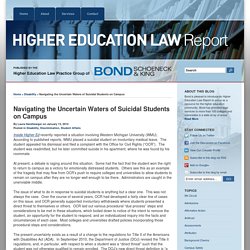
According to published reports, WMU placed a suicidal student on involuntary medical leave. The student appealed his dismissal and filed a complaint with the Office for Civil Rights (“OCR”). The student was readmitted, but he later committed suicide in his apartment, where he was found by his roommate. At present, a debate is raging around this situation. Some hail the fact that the student won the right to return to campus as a victory for emotionally distressed students. The issue of what to do in response to suicidal students is anything but a clear one.
The present uncertainty exists as a result of a change to the regulations for Title II of the Americans with Disabilities Act (ADA). MentalHealth.gov. A Growing Number of College Students are Seeking Help for Anxiety, Depression, Stress, and Psychological Disorders. Mental Health has become a critical issue on college campuses.
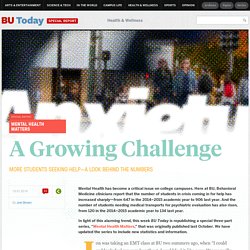
Here at BU, Behavioral Medicine clinicians report that the number of students in crisis coming in for help has increased sharply—from 647 in the 2014–2015 academic year to 906 last year. And the number of students needing medical transports for psychiatric evaluation has also risen, from 120 in the 2014–2015 academic year to 134 last year. In light of this alarming trend, this week BU Today is republishing a special three-part series, “Mental Health Matters,” that was originally published last October. We have updated the series to include new statistics and information. Jon was taking an EMT class at BU two summers ago, when “I could suddenly feel my own heartbeat.
Pain in his left arm followed. Mental health on college campuses: A look at the numbers. Photo by Bria Granville Approximately 42,773 Americans commit suicide every year, according to the American Foundation for Suicide Prevention, many of who are college students.
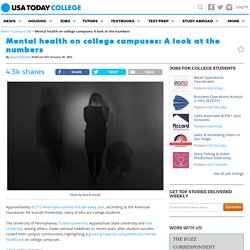
The University of Pennsylvania, Tulane University, Appalachian State University and Yale University, among others, made national headlines in recent years after student suicides rocked their campus communities, highlighting a growing need for comprehensive mental healthcare on college campuses. A look at the statistics: Sarah Sabatke is a University of Missouri student and a USA TODAY College correspondent. Mental health policies at universities draw increasing concern. CampusMHAP Web final. College Students Speak A Survey Report on Mental Health NAMI 2012. A Growing Number of College Students are Seeking Help for Anxiety, Depression, Stress, and Psychological Disorders.
Mental Health has become a critical issue on college campuses.

Here at BU, Behavioral Medicine clinicians report that the number of students in crisis coming in for help has more than doubled—from 290 in the 2010–2011 academic year to 647 last year. And the number of students needing medical transports for psychiatric evaluation has also risen, from 68 in the 2010–2011 academic year to 120 last year. In light of this alarming trend, this week BU Today is publishing a special four-part series, “Mental Health Matters.”
Jon was taking an EMT class at BU two summers ago, when “I could suddenly feel my own heartbeat. I could feel it,” he says. Pain in his left arm followed. His family doctor “was the first one to say, ‘I think you just had a panic attack,’” says Jon. “Students are reporting significantly higher levels of anxiety, depression and stress-related problems than they have in the past.” Jon is one of many. The College Student Mental Health Crisis. Essay on how faculty members can respond to unstable students. Stress Management: How to Reduce, Prevent, and Cope with Stress. What you can do Move your body frequently—don't sit for more than an hour Make positive face-to-face connection with other people a priority When you can't change the stressor, learn to avoid, alter, adapt, or accept Reduce your intake of alcohol, nicotine, and caffeine Do something you enjoy every day Get all the restful sleep that you need to feel your best Learn more by reading the related articles What are the best tips for managing stress?

What creates disabling stress in one person, may not have the same affect on another. What best relieves stress is also personal. You may have tried some simple sounding formulas for managing your stress and found that they really aren’t that helpful. Suicide prevention on campus: Removing the stigma. The student tried to get support from family and was turned away.
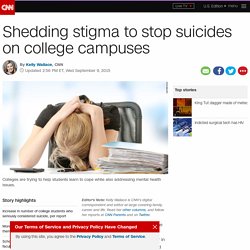
"There's no question that the services we will give to (the student) will change (the student's) life ... and reducing stigma for those people is absolutely important and critical," said Locke. As that story suggests, mental health needs on campus are real and serious. They're also growing, which is why as the first weeks of classes get underway at colleges and universities across the country, institutions are ramping up operations to try to keep their students safe. The statistics are alarming. Equally concerning is the significant increase in the percentage of students who have purposely harmed themselves, such as engaging in cutting, hitting, burning and hair pulling, without intending to kill themselves. "So universities are coping with the consequences of these kinds of behaviors and thoughts in ways that we haven't necessarily seen historically on a much greater scale. " What schools are doing to help Removing the stigma. Navigating the Uncertain Waters of Suicidal Students on Campus.
Should Suicidal Students Be Forced to Leave Campus? The College Student Mental Health Crisis. Essay on how faculty members can respond to unstable students. NAMI: The National Alliance on Mental Illness. There is much we now know about students and the mental health issues they experience while attending college.
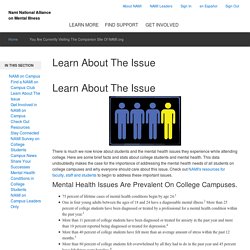
Here are some brief facts and stats about college students and mental health. This data undoubtedly makes the case for the importance of addressing the mental health needs of all students on college campuses and why everyone should care about this issue.